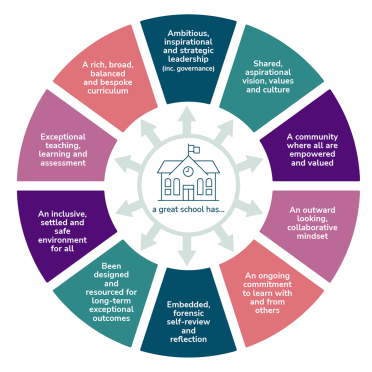A great school recognises that when the community is involved and empowered, the outcomes for pupils are improved.
The great school seeks to embed a culture of active engagement with stakeholders to understand and build upon the narratives, experiences and perspectives of the whole community and meet the needs of all groups. Leaders of great schools actively welcome and have a proactive programme for gaining feedback about what is working well and what could be improved - through pupil voice activities, school councils, network meetings, surveys and focus groups. There is demonstrable evidence that voices across the school are regularly heard, valued and responded to - shaping the school’s strategic planning.
A great school recognises the significant role that parents and carers play in the educational outcomes of pupils, and seeks to build learning partnerships with all families, especially those which are hard to reach. The school shows commitment to a genuinely two-way communication process, which focuses on learning and wellbeing as well as the practicalities of school life. Staff appreciate that they cannot fully understand their pupils if they do not have knowledge of their out-of-school lives, influences and experiences and so they create opportunities for developing their knowledge of the students’ lives out of school and they reflect on and utilise the knowledge they glean. They understand and celebrate the opportunities – but also appreciate and address the challenges – presented by their particular community context.
The great school and its community create shared beliefs about what they can achieve together. The school effectively promotes community cohesion, safeguards children from exploitation and challenges extremism. All pupils, supported and encouraged by the school, are contributing to and enriching the local area. The school’s facilities and resources are utilised fully by local people. A wealth of community groups are linked with the school and involved in enriching the curriculum. Through these strong links the school’s ethos permeates the locality.
This lens will typically be reflected in:
- School vision/mission statement
- Staff and student personal development targets
- Staff and student personal development coaching
- SEND and inclusion policies
- Equal Opportunities Policy
- Parental Engagement Policy
- Parent partnerships
- Home Visits Procedures
- Home-School Agreement
- Schedule of parent workshops/ parent events
- PTA minutes
- Community Engagement Policy
- Community Lettings Policy
- Community events: fayres, festivals etc.
- Student Community Service/Give Back/citizenship activities/systems
- Transition arrangements
- Community and parent sections of school website
- eLearning Policy
- Programme of community speakers/visitors
- Governor meetings with schools' council and parent groups
General documents, policies and procedures in which you might typically see the lenses reflected.
Case studies
Resources
-
Summer 2021
Why I’m no longer talking to white people about race - Reni Eddo-Lodge, 2017
White Fragility - Robin DiAngelo, 2018
Natives: Race and Class in the Ruins of Empire - Akala, 2018
SWAY:Unravelling Unconscious Bias - Dr Pragya Agarwal, 2020
The Thinking School – Kulvarn Atwal, 2019
Wish We Knew What to Say: Talking with Children about Race – Pragya Agarwal, 2020
Bias in the Early Years – Stella Louis blog: www.famly.co/blog/bias-in-early-years
Spring 2020
https://hungrylittleminds.campaign.gov.uk/
HFL Early Years team blogs:
www.hfleducation.org/blog/more-you-read-more-youll-knowhelping-parents-read-their-children-home
Autumn 2019
Great Minds and How to Grow Them - Wendy Berliner and Deborah Eyre, 2017
The Restless School - Roy Blatchford, 2014
Place and Belonging in Schools: Riley & Coates
How Children Succeed: Paul Tough, 2014
Whose School is it Anyway? Kathryn Riley
Quiet: The Power of Introverts in a World That Can't Stop Talking - Susan Cain, 2013
Schools must speak for themselves: Arguments for School Self-evaluation (What's in It for Schools) - J MacBeath, 1999

Ways in which HFL can provide support
Eliminating Economic Exclusion (EEE) review
Pupil Premium reviews
Race equity and anti-racism reviews and training
Parental engagement tools - Data Management Services
Transition support - Early Years
Inclusion support – protected characteristics, anti-racism and SEND services
Conflict management support – HR Services
Governance Leadership Service - Governance Services
Effective complaints and issue resolution support - Complaints Management Services
Please contact us for further information on 01438 544464 or email info@hfleducation.org
The Great School Framework is made up of:
Ambitious, inspirational and strategic leadership (inc. governance)
Shared, aspirational vision, values and culture
A community where all are empowered and valued
An outward looking, collaborative mindset
An ongoing commitment to learn with and from others
Embedded, forensic self-review and reflection
Been designed and resourced for long term exceptional outcomes
An inclusive, settled and safe environment for all
Exceptional teaching, learning and assessment
A rich, broad, balanced and bespoke curriculum
The Great School Framework is the intellectual property of HFL Education and copyrighted. It may not be used unacknowledged by others.


